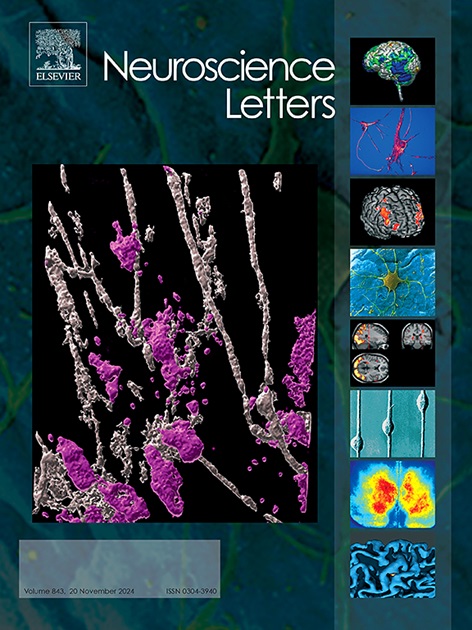Masitinib attenuates neuropathological changes in acrolein-induced sAD mouse model via NF-κB/NLRP3/Caspase-1 signaling pathway
IF 2
4区 医学
Q3 NEUROSCIENCES
引用次数: 0
Abstract
Alzheimer’s Disease (AD) is a global health crisis, with sporadic AD (sAD) accounting for more than 95 % of all cases. The lack of effective disease-modifying therapies for sAD, driven by its complex pathogenesis involving genetic, environmental, and lifestyle factors, underscores the urgent need for novel treatments. Masitinib, an oral tyrosine kinase inhibitor originally developed for cancer treatment, has shown potential to regulate mast cells and neuroinflammation, making it a promising candidate against AD. In this study, we investigated the therapeutic effects of masitinib (60 mg/kg/day) in acrolein-induced sAD mouse model. A comprehensive series of behavioral tests, including the buried food pellet tests, Morris water maze, Y-maze, open field, and elevated plus maze, along with Western blot, immunofluorescence and Golgi-Cox staining were used to evaluate pathological changes. The results showed that masitinib significantly improved acrolein-induced olfactory deficits, cognitive dysfunction, particularly in learning and memory, and anxiety-like behaviors. Additionally, masitinib not only reduced p-Tau levels, increased PSD95 expression and restored dendritic spine density, but also suppressed neuroinflammation by inhibiting the NF-κB/NLRP3/caspase-1 inflammatory pathway and microglial activation. These findings demonstrate that masitinib, for the first time, attenuates sAD pathology through dual mechanisms of cognitive enhancement and neuroprotection. Our study provides strong preclinical evidence to support further clinical development of masitinib as a disease-modifying therapy for sAD.

马西替尼通过NF-κB/NLRP3/Caspase-1信号通路减弱丙烯醛诱导的sAD小鼠模型的神经病理改变。
阿尔茨海默病(AD)是一种全球性的健康危机,散发性AD (sAD)占所有病例的95% %以上。由于sAD复杂的发病机制涉及遗传、环境和生活方式等因素,缺乏有效的疾病改善疗法,因此迫切需要新的治疗方法。Masitinib是一种最初用于癌症治疗的口服酪氨酸激酶抑制剂,已显示出调节肥大细胞和神经炎症的潜力,使其成为治疗AD的有希望的候选者。在本研究中,我们研究了马西替尼(60 mg/kg/day)对丙烯醛诱导的sAD小鼠模型的治疗作用。采用埋藏食物颗粒实验、Morris水迷宫、y形迷宫、空地迷宫、高架迷宫等行为学实验,结合Western blot、免疫荧光、高尔基-考克斯染色等方法评价病理变化。结果显示,马西替尼显著改善丙烯醛诱导的嗅觉缺陷、认知功能障碍(尤其是学习和记忆障碍)和焦虑样行为。此外,马西替尼不仅可以降低p-Tau水平,增加PSD95表达,恢复树突棘密度,还可以通过抑制NF-κB/NLRP3/caspase-1炎症通路和小胶质细胞活化来抑制神经炎症。这些发现首次表明,马西替尼通过认知增强和神经保护的双重机制减轻了sAD病理。我们的研究提供了强有力的临床前证据,支持进一步临床开发马西替尼作为sAD的疾病改善疗法。
本文章由计算机程序翻译,如有差异,请以英文原文为准。
求助全文
约1分钟内获得全文
求助全文
来源期刊

Neuroscience Letters
医学-神经科学
CiteScore
5.20
自引率
0.00%
发文量
408
审稿时长
50 days
期刊介绍:
Neuroscience Letters is devoted to the rapid publication of short, high-quality papers of interest to the broad community of neuroscientists. Only papers which will make a significant addition to the literature in the field will be published. Papers in all areas of neuroscience - molecular, cellular, developmental, systems, behavioral and cognitive, as well as computational - will be considered for publication. Submission of laboratory investigations that shed light on disease mechanisms is encouraged. Special Issues, edited by Guest Editors to cover new and rapidly-moving areas, will include invited mini-reviews. Occasional mini-reviews in especially timely areas will be considered for publication, without invitation, outside of Special Issues; these un-solicited mini-reviews can be submitted without invitation but must be of very high quality. Clinical studies will also be published if they provide new information about organization or actions of the nervous system, or provide new insights into the neurobiology of disease. NSL does not publish case reports.
 求助内容:
求助内容: 应助结果提醒方式:
应助结果提醒方式:


